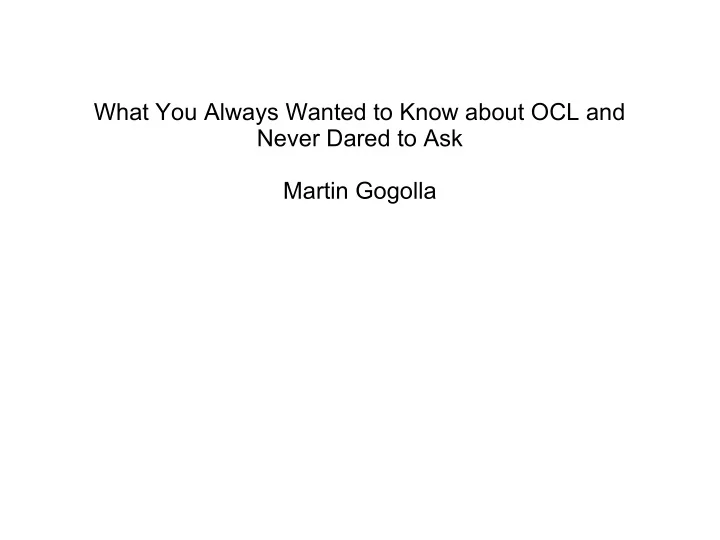

What You Always Wanted to Know about OCL and Never Dared to Ask Martin Gogolla Personally, i never use OCL, i always use USE OCL OCL is a nice, useful language, for driving with your finger through a class diagram. But there are some things worth to be debated ...
What You Always Wanted to Know about OCL and Never Dared to Ask Martin Gogolla Personally, i never use OCL, i always use USE OCL OCL is a nice, useful language, for driving with your finger through a class diagram. But there are some things worth to be debated ...
What You Always Wanted to Know about OCL and Never Dared to Ask Martin Gogolla Personally, i never use OCL, i always use USE OCL OCL is a nice, useful language, for driving with your finger through a class diagram. But there are some things worth to be debated ...
Technical aspects of OCL leading to debates ● Collection operations collect, collectNested; missing backward compatibility of collect ● Navigation and typing in n-ary associations; missing resp. wrong functionality ● Dot VS arrow; attention required after 20 OCL years; Seq{Set{7,8},Set{9}}->size, Seq{Set{7,8},Set{9}}.size ● Dot shortcut very useful, but difficult to explain technically ● 0..1/1..1 handling; changes to * (or the other way round) invalidates expressions ● Keyword/name harmonization and length: Set, Bag, Sequence, OrderedSet; at VS subOrderedSet ● Ordered set properties: Ord{7,8,7} =/<> Ord{8,7,7} (long) unclear in standard
Technical aspects of OCL leading to debates ● 3-valued VS 4-valued (VS 2-valued) logic; relationship to and harmonization with SQL ● Set{} VS oclEmpty(Set(Integer)), oclEmpty(Set(Person)), ... ● size() VS size [as in OCL 1.X] ● Referential transparency (A=B => f(A)=f(B)): E=E, Set{7,8}->asSeq()=Set{7,8}->asSeq() not required in standard ● Workarounds for explicitly typing of expressions with let, given albert:Prof > Person let albertP:Person=albert in expr-albertP-is-Person
Views on and uses of OCL ● Several implementations, used in many projects, no UML/MODELS conference without OCL papers ● OCL @ USE (University of Bremen) for 20 years ● Following quotes come from memory, not liable for trial ● Perdita Stevens: 'OCL is probably the best part of UML' ● Oystein Haugen: 'OCL is completely useless and inacceptable' ● Albert Zündorf: 'OCL has strange typing rules' (navigation results in Set(...), Bag(...), ...) ● Jean Bezivin: 'OCL navigation is too tedious, more automatism' ● OCL: object *CONSTRAINT* language; SQL: structured *QUERY* language; both good for *C* and *Q* ● OCL independent of UML, embedding into other langs (ATL, ...) ● OCL to large degree object-independent, collections and collections operations [OCL heart] applicable without objects
Thanks for your attention!
Recommend
More recommend